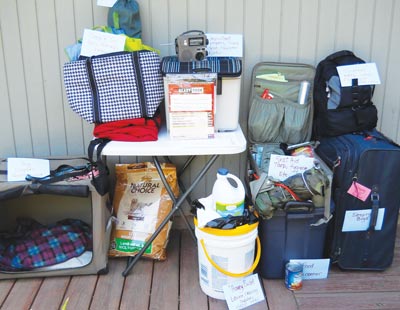With fire activity and evacuations in the news lately, we thought everyone should be prepared – start by reading this informative article about preparing your “Go-Bag!”
Jacksonville Review, September 2013 – During Jacksonville CERT’s recent activation at the Joint Information Center when area wildfires began, part of our job was talking to residents about being prepared to evacuate their homes. One of the most useful tools we had was a Ready, Set, Go description of the three levels of evacuation planning. This program was developed in 2011 to improve communication between fire departments and the residents they serve. It is managed by the International Association of
Fire Chiefs. This program helps residents be Ready with preparedness understanding, be Set with situational awareness when fire threatens, and to Go, acting early when a fire starts.
Ready means your household taking responsibility to prepare well before a fire ever threatens your home. This can be done by creating defensible space around your home and using fire-safe construction materials. You should also assemble emergency supplies and important belongings in a safe place. Prepare an emergency plan and practice it.
Set is when you pack your emergency and valuable items. Be aware of the fire situation and stay informed of the fire progression.
Go means you act early and implement your personal emergency plan. By leaving immediately when asked by emergency personnel, you are safer and it allows the firefighters to get in with the resources they need to combat the fire.
You can find a full description of this program at www.wildlandfirersg.org.
There are also numerous websites filled with excellent information to help you prepare your emergency “Go Kit.” A good resource is www.Ready.gov/basic-disaster-supplies-kit. Another is http://GoStayKit.com. This program was developed right here in Southern Oregon and has been adopted across the country.
And don’t forget about your animals. They need their own “Go Kit,” as well. You can find more information for animal evacuation at the Ready.gov website.
By preparing now, you can reduce the fear, anxiety, and losses that accompany disasters.
